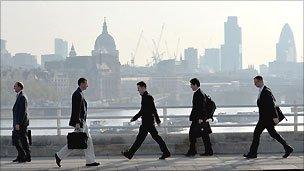Graduate jobs market 'better than feared'
- Published

London is a magnet for graduates - with one in five new graduates working in the capital
The employment prospects of graduates are "much better than feared", although this might include a stretch of catering and bar work, says a survey.
Despite a tough labour market, the Higher Education Careers Service Unit says 62% have jobs six months after university and 9% are unemployed - figures similar to the year before.
A third of graduates are working in London and south-east England.
There are also signs that more young graduates are self-employed.
This UK report from the Higher Education Careers Service Unit (Hecsu) and Association of Graduate Careers Advisory Services provides a detailed look at the paths taken six months after graduation - based on the cohort leaving university in 2011.
Bar work
Despite rising number of graduates and a struggling economy hitting recruitment, the graduate jobs market has remained relatively resilient.
It echoes previous studies showing that in the long term, graduates are likely to earn higher incomes than non-graduates and are less likely to face unemployment.
It also reflects that the jobs market is changing - with more demand for graduates and skilled workers.
This latest study shows a stable picture - with 62% of recent graduates in employment, 9% unemployed, 14% staying on for further study and the remainder in a mixture of training while working and other activities.
This snapshot, taken before many young people have settled into their intended careers, shows what type of jobs graduates are doing six months after leaving their first degrees.
It shows that many are still in non-graduate jobs.
The most typical sector is in retail, catering and bar staff, representing about 15% of young graduates. There are 13% in health sector jobs, 8% in business and financial jobs and about 7% in media and design.
Few people will have entered jobs which usually require postgraduate training, such as law.
The weak economy might have inspired more students to start up their own businesses - with a steady upward entrepreneurial trend in self-employment. This is now approaching 5% of university leavers - up from 3% in the middle of the last decade.
Geographical spread
Cuts in public sector spending could also be affecting the jobs market, says the survey - with reductions in the numbers of graduates going into a range of posts in health, education and social services.
In terms of the geographical spread of jobs for new graduates, there is a strong bias towards London and the south-east of England.
One in five of all recent graduates who are in employment are working in London, by far the largest share of the graduate jobs market. The next biggest provider of jobs is the south-east of England.
In contrast, within England the lowest proportion of graduates are working in the North East and east Midlands.
In terms of salaries, the typical range of earnings was between about £18,000 and £24,000 for those graduates who had jobs six months after leaving university.
The deputy research director at Hecsu, Charlie Ball, says that in a "difficult jobs market" and a struggling economy "over 166,000 of last year's graduates were known to be working in the UK six months after leaving university - nearly 8,000 more than the previous year".
"The figures show that even in difficult times, graduates can and do get jobs."
- Published18 May 2011
- Published11 January 2012
- Published24 October 2011